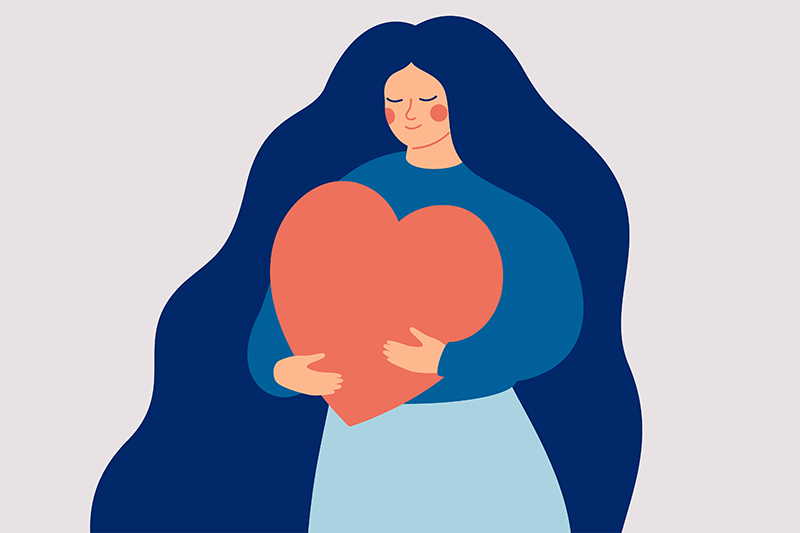Accepting ourselves as disabled people is key to autistic well-being. Far from defeatist, identifying as disabled is empowering. When we understand ourselves as disabled, anxiety goes down, and self-esteem goes up.

For a long time, I compared myself to non-autistic people, and they seemed to get through their busy days relatively intact. I was a single parent working more than full-time, and I wrote on top of that. I was also regularly involved in social justice projects. I would come home at the end of a packed day and just sit in my car, burned out and needing time to recover my energy. On the other hand, I observed non-autistic colleagues and friends similarly juggling family and professional life, and while, of course, they got tired and overwhelmed occasionally, they did not necessarily burn out. Even during stressful periods, they seemed to manage day-to-day activities with a certain aplomb, getting each thing done efficiently enough.
The prevailing message from society was that I should be able to do it all with facility. I blamed myself that I couldn’t do it all and still have energy to spare. I internalized the idea that something was wrong with me.
Yet, think for a moment all that is involved in a trip to the grocery store. The amount of executive functioning required for grocery shopping is tremendous! Many systems of the brain are involved: remembering what you need to buy, visually sorting through the excessive profusion of junk in most grocery stores, sequencing what to do first or last, selecting what you want, organizing your money and shopping bags… Most grocery stores are a sensory nightmare, replete with loud noises, crammed aisles, horrible smells, glaring lights… Social interactions – planned and unplanned – are almost guaranteed.
Now, if grocery stores were logically ordered, quiet, replete with signs that made sense, if shoppers did not have to race through the checkout line, and if our lives in this society were not so hectic such that we had plenty of time to do our shopping at a comfortable pace – autistic people might not have any problem shopping. Much of the trouble autistic people experience is external to being autistic. We need to hold society accountable for reducing challenges that do not need to exist.
That said, here we are – with illogical grocery stores that are too loud, too bright, too crowded, too stinky, and too rushed. Anyone might find grocery shopping in these conditions arduous or annoying, at least sometimes. The difference for those of us who are autistic is that we can’t change the way we are.
Our disability is largely invisible. If I used a wheelchair and thus it took me longer to get errands done, or if I needed assistance reaching items on the shelves, I hope others would be understanding. In my 20s, I worked at a health food store, and I helped a blind shopper who came in weekly by leading her to items, reading packages, and putting her items into the cart. None of the cashiers rushed her through the checkout process.
But people can’t readily identify that autistic folks often need extra processing time to make choices. They can’t intrinsically tell that an autistic person is seriously uncomfortable due to the ridiculous noise level. They don’t anticipate that we may need help determining what order to shop in – frozen items could melt by the time we go pay if we load them into the cart first, but shopping instructions are not provided. People are frequently impatient if we use communication devices, struggle with math or reading, or get stressed by the demand to pay quickly while bagging our items at the same time.
Exhausted from all of this, imagine how it feels when people say, “Well, shopping is hard for everyone!”
As soon as I could say, “No! This is disability-related. I deserve some understanding here,” a weight was lifted off my (metaphoric) shoulders.
When autistic people accept that we are disabled, we can stop comparing ourselves to the non-disabled majority. I do, on occasion, shop if I want to – luckily, there is a grocery store near me that is quiet and familiar and comfortable. But I also now use the Instacart app regularly. I pay $99 a year for a subscription, which waives delivery fees. This has been a life-changer. The app is not an indulgence or a convenience. I can save lists of what I typically buy, reducing the executive functioning involved. I do not have to contend with any sensory issues. And I can check out by pressing a button. The app is as necessary as glasses, a cane, a ramp, or ASL. Using the app on a regular basis because I am disabled has improved the quality of my life tremendously.
Once I understood myself as disabled, I could give myself grace.
Mental wellness can blossom when we embrace being disabled. Disability is not tragic – it is simply an aspect of the human experience. We can embrace what we need for a “good functioning” life and demand respect for our needs. Equally important, we can join broader movements for disability justice that call on society to reduce artificially produced trouble. Perhaps in the future, with wider accommodation, access, inclusion, and tolerance, we won’t struggle so much. Meanwhile, we no longer need to judge ourselves or feel ashamed. Rather, we are fully human – disabled humans. This is indeed a very freeing realization.
Zosia Zaks, PhD, consults with schools, organizations, and businesses seeking to build inclusive and equitable spaces and to prepare for neurodiversity paradigm change. Previously, Dr. Zaks counseled autistic teenagers and young adults and those with similar conditions for more than twenty years and supported them to live and work in their communities. He also teaches autism studies courses, conducts research on developmental diversity, and writes and speaks nationally on disability justice. Zosia earned his doctorate in human development from Fielding University. He brings a unique mix of perspectives to his projects and advocacy as a mental health professional, an educator, a parent of two neurodivergent young adults, and as an autistic transgender self-advocate.





Great article, Dr. Zaks. You have a very memorable name. I remember it as I am including your article, “Moving to a neurodiversity-affirming paradigm in the support system: Autistic professionals as paradigm change,” in my current dissertation work and in the article I wrote for this issue, “Navigating Autistic Shutdown and Burnout Through a Neurodiversity-Affirming Approach.” I love seeing your work in the same Spring issue.